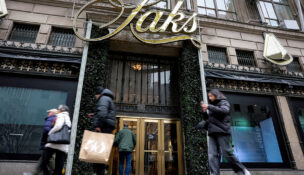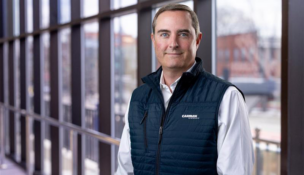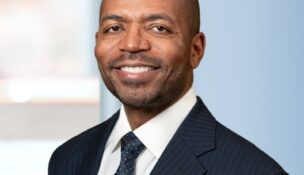U.Va. hires AstraZeneca exec to lead Manning biotech institute
Esser has Ph.D. from U.Va.'s medical school
Kate Andrews //April 10, 2025//

Mark T. Esser is the incoming head of the University of Virginia's Manning Institute of Biotechnology. Photo courtesy UVA Health

Mark T. Esser is the incoming head of the University of Virginia's Manning Institute of Biotechnology. Photo courtesy UVA Health
U.Va. hires AstraZeneca exec to lead Manning biotech institute
Esser has Ph.D. from U.Va.'s medical school
Kate Andrews //April 10, 2025//
Mark T. Esser, vice president for vaccines and immune therapies at pharmaceutical giant AstraZeneca, will be the inaugural chief scientific officer and leader of the Paul and Diane Manning Institute of Biotechnology at the University of Virginia, U.Va. announced Thursday.
Esser, who will join U.Va. May 1, earned a Ph.D. in microbiology in 1998 from U.Va.’s medical school, and has worked in translational medicine at AstraZeneca, MedImmune (which was acquired by AstraZeneca) and Merck. He was involved with development of Evusheld, a medicine that helped prevent and treat COVID-19; infection and cancer vaccine programs; human papillomavirus vaccines; and a monoclonal antibody that helps prevent RSV in infants.
The $350 million Manning Institute, launched in 2023 with a $100 million donation from Albemarle County investors Paul and Diane Manning, is a hub for biotech research, development and manufacturing at U.Va., which is building a 350,000-square-foot structure in Fontaine Research Park in Charlottesville that’s expected to open by late 2026 or early 2027, according to Paul Manning. A member of the university’s board of visitors, Manning founded PBM Products, an infant formula and baby food business, which he sold to Perrigo for an estimated $808 million in 2010. He then started PBM Capital, a private equity firm that invests in pharmaceutical and life sciences startups.
The focus of the institute is research like cellular therapy, gene therapy, nanotechnology and drug delivery, as well as expanding U.Va.’s clinical trial offerings. According to Thursday’s announcement, Esser will be tasked with fostering an “ecosystem of innovation” to attract biotech and pharmaceutical companies and jobs to Central Virginia. U.Va. is also developing a statewide clinical trials network to expand availability of new treatments while they’re being tested.
“Job one is going to be to meet and get to know all the world-class scientists and physicians at Virginia. And then job two is going to be really crafting out the shared vision for what this institute can accomplish, and getting the best and the brightest not only at the university, but around the country and around the world, to join the institute to transform cutting-edge science into future medicines,” Esser said in an interview with Virginia Business on Thursday.
He noted that developing cancer immunotherapies would “play to the University of Virginia’s strengths,” as well as allergy and autoimmunity treatments. Developing gene therapies to treat neurodegenerative diseases such as Alzheimer’s and Parkinson’s is also a high priority, Esser added.
“We are fortunate to have found an ideal candidate in Dr. Mark Esser to lead the Manning Institute,” U.Va. President James E. Ryan said in a statement. “He brings both great scientific expertise and decades of experience in developing new treatments and medical breakthroughs. He is a bridge-builder who knows how to work collaboratively, how to work efficiently and how to get things done. He will be the lynchpin in realizing the potential of the Manning Institute to shape the future of medicine.”
Esser was previously a senior research fellow and senior research immunologist at Merck Research Laboratories, and after receiving his doctorate, he did his postdoctoral fellowship with the National Institutes of Health’s AIDS vaccine program.

Paul Manning, speaking with Virginia Business on Thursday, said that Esser’s commercial and academic background were important reasons for his hiring. “It’s our goal to get medicine into patients,” Manning said. “That’s the goal, to work with the researchers and work with the regulatory agencies in order to move products through the continuum from basic research through clinical development and into the patients. Part of that continuum is understanding where the biotech companies and Big Pharma [are] in order to find a home for these medications.”
Asked about the Trump administration’s proposed 15% cap on National Institutes for Health funding for overhead expenses, which is causing widespread concern at research universities nationwide, Manning said that “the University of Virginia will be able to figure this out, and we will keep an eye on what Washington’s doing. Right now, it’s steady as it goes.” Last week, a federal judge permanently barred the administration from limiting funding from the NIH that supports university and medical center research, but the White House is likely to appeal the ruling.
Esser said that with the possibility of NIH cuts, the Manning Institute and other research institutions are looking to private industry for funding, including biotech and pharmaceutical companies, venture capital investors and nongovernmental organizations like the Bill and Melinda Gates Foundation.
“Even in a big pharmaceutical company, there’s never enough money,” he said. “There’s always more things to do than dollars to do that. … I think if we come up with good ideas, I’m 100% confident we’ll find people to fund them.”
Manning added that funding for the institute’s new building and hiring more researchers is safe, as $150 million in state funding has already been approved by Virginia legislators, and U.Va. is adding $100 million to the $350 million project.
“You’ll see great progress over the next six, eight months,” Manning said, especially with Esser on board.
g

















